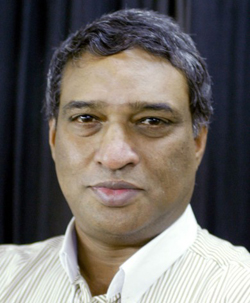A World Drowning in Oil
DOHA, Qatar, Apr 18 (IPS) - Thanks to tensions between Saudi Arabia and Iran, major oil producers couldn't come to an agreement in Doha to freeze their output to January levels to raise oil prices. The current low oil prices have a lot to do with the grim outlook for global economic growth while supply is growing. China, the second largest economy in the world, is slowing down. Not surprisingly, global oil demand is much lower at 94.8 million barrels a day vis-à-vis supply of 96.3 million barrels a day in the first quarter of 2016 according to the International Energy Agency.
 N Chandra MohanLow prices are no doubt hurting producers like Saudi Arabia, Kuwait, UAE and Qatar, forcing them to run huge deficits as their oil revenues shrink while expenditures keep mounting. Iran, which is just free from US sanctions, too, wants to sell as much as possible to modernise its economy. Paradoxically, these talks to curb rather than cut output have failed when major oil producers are pumping as much oil as possible. Saudi Arabia, for instance, produced 10.2 million barrels a day in March, close to previous record highs. How then can prices start rising again?
N Chandra MohanLow prices are no doubt hurting producers like Saudi Arabia, Kuwait, UAE and Qatar, forcing them to run huge deficits as their oil revenues shrink while expenditures keep mounting. Iran, which is just free from US sanctions, too, wants to sell as much as possible to modernise its economy. Paradoxically, these talks to curb rather than cut output have failed when major oil producers are pumping as much oil as possible. Saudi Arabia, for instance, produced 10.2 million barrels a day in March, close to previous record highs. How then can prices start rising again?
For such reasons, a freeze – even if it did materialise -- is unlikely to have made much of an impact in getting prices back up again. The current levels of Brent crude at $40 a barrel reflect excess supply. The global oil market is nervous that Saudi Arabia's tension with Iran for dominance in West Asia can get out of hand. Geopolitical tensions in Syria, Libya and Iraq are also fast-escalating. Although prices can spike upwards, they are kept low by excess supply as demand is declining due to weaker global growth. But with lower US shale oil production, supply and demand may balance later this year.
Instead of a freeze, an excess supply situation normally ought to signal to dominant producers like Saudi Arabia or the Organisation of Petroleum Exporting Countries (OPEC) to cut production to avoid a build-up of stock and ensure higher prices. But this is exactly what they have chosen not to do for geopolitical reasons. One year ago, Ali Ali-Naimi, Saudi's oil minister asked "Why should we cut production?" on the sidelights of a climate conference in Lima. The Saudis resistance to lowering oil output is to squeeze out high cost producers and rivals like shale oil producers in the US and Iran.
The House of Saud and allies like Kuwait and the UAE were ready for prices even as low as even $20 a barrel. There is no doubt that low prices adversely affect the economics of oil extraction from shale. The US is now self-sufficient for its energy requirements and has emerged as a major swing producer in the global oil market. But in recent months, there are signs that shale producers in that country are experiencing a boom-bust cycle and the decks are being cleared for a decline in shale oil production. The Saudis expect higher prices to reflect such factors on the ground.
Saudi Arabia's compulsions of late have changed due to rapidly dwindling coffers and losing out in 9 out of 15 key markets where it sold oil from 2013 to 2015 according to Financial Times. Its share of China's imports thus has dropped from 19.4 per cent to 15.4 per cent over this period. Today, the Saudis prefer oil prices in the range of $60 to $80 a barrel to encourage demand and discourage supplies from high cost non-OPEC producers. But the contradiction is that they are now stepping up than cutting production to shore up their budgets and contributing to the persistence of global excess supply.
All of this ensures Brent crude prices that are no different from 2015. In any case, a production freeze can only succeed if all the major oil producers, including Iran, agree to do so. Iran, for its part, did not participate in this meeting in Doha. When both oil producers pump up more and more oil, how will prices rise? Saudi Arabia needs oil at $95.8 a barrel for its budget to balance. Iran needs oil at $70.4 a barrel according to the International Monetary Fund. The yawning gap between the current Brent crude and fiscal break-even prices is the difference between reality and unrealistic budgetary hopes.
If global oil prices remain depressed, the Gulf economies need to envision a future beyond oil. as we have written earlier. This is bad news for the millions of expatriate workers from South Asian countries like India, Pakistan, Bangladesh and Nepal who work in these economies. If the oil revenue-financed boom is over, many of them will be forced to return home. Already there are signs that remittances are declining. A world drowning in oil spells the end of the Gulf dream as major economies register slower growth in the rest of this year and beyond.
(End)
© Inter Press Service (2016) — All Rights ReservedOriginal source: Inter Press Service
 Global Issues
Global Issues